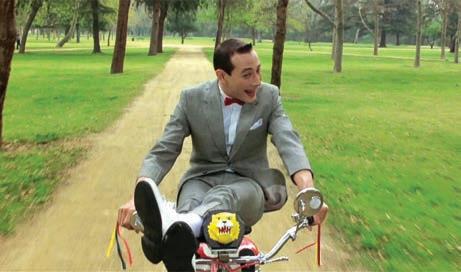
5 minute read
A legacy bigger than ‘Pee-Wee’ Reubens never came out despite character’s roots in camp
By JOHN PAUL KING
Even though most of us assumed he was gay, Paul Reubens never officially came out.
He scarcely had to, really. His public image – indelibly associated with a character whose name became essentially synonymous with his own – was built on a foundation of camp, and the children’s TV series that brought him into the households of millions of grateful parents was renowned for its ability to offer genuinely innocent entertainment for kids while simultaneously keeping the grown-ups in the room laughing with the kind of winking adult humor that would go right over the little ones’ heads. Much of that humor was laced with obvious queer subtext, and the overall look and tone of the show, from its kitschy design to its to Pee-Wee’s starry-eyed fondness for his friend Cowboy Curtis (as portrayed by a young Laurence Fishburne), made his queerness appear so obvious that coming out would be a mere formality. This was queer underground culture exploding into the mainstream under camouflage of whimsy, all being orchestrated by a master showman who had to know exactly what he was doing.
Yet in the public record, there was never any verification of Reubens’s place on the sexuality spectrum. Indeed, the facts favor a heterosexual orientation – a temporary “marriage” to Doris Duke heiress Chandi Heffner, concocted as an impromptu publicity stunt, and his long-term relationship with actress Debi Mazar, whom he credited with helping him overcome his depression after the notorious 1991 public indecency charge that derailed his career.
As to that incident, Reubens came to be as known for it as much as for being Pee-Wee. Arrested for public masturbation during a surprise police inspection at an adult theater in Sarasota, Fla., he avoided the misdemeanor charge with a plea bargain and 75 hours of community service – but the real punishment, which no court of law could stay, was assured as soon as the news of his salacious “crime” broke to the press the day after his arrest.
A victim of “cancel culture” before the term had ever been coined, he became the butt of 1,000 prurient jokes by late-night TV comedians; worse, he was the target of countless tabloid “exposés” playing to the alarmist fears and prejudices of religious conservatives. Both Reubens and his bow-tied alter-ego quickly became persona non grata in the eyes of pop culture.
A decade later, there was another scandal. In 2002, after Reubens was named by an informant in the child pornography case against fellow actor Jeffrey Jones, Los Angeles police raided his home and found images they claimed depicted minors engaged in sexual conduct; though the material consisted mostly of old beefcake magazines and other gay-themed vintage erotica, he was charged with misdemeanor possession. There was another plea bargain, this time leading to a three-year registration as a sex offender, but Reubens maintained his innocence, characterizing the images in question as art rather than pornography – an eternal debate that hardly mattered to anyone who had already made up their mind about him.
Incredibly, perhaps, that wasn’t the end of his story. In 2010, he mounted a new version of “The Pee-Wee Herman Show” stage performance that had originally launched the character in the early 1980s, and thanks to a shift in attitudes, coupled with inexorable childhood nostalgia from the now-grown fans of his TV show, the rebooted Pee-Wee was a hit once more. After a sold-out Los Angeles run, the production moved to Broadway for a limited engagement and played to equally packed houses.
Reubens would continue to be active. After several attempts to develop a new film project for the character – the first, “Pee-Wee’s Big Adventure” (1985), had been a surprise sensation that established director Tim Burton as a star in his own right – he succeeded with Netflix’s “Pee-Wee’s Big Holiday” (2016), which took him on a cross-country quest fueled by his budding “bromance” with hunky actor Joe Manganiello. More overtly gay in subtext than any of his prior efforts, it still became a hit; in retrospect it felt like the moment when Reubens – and Pee-Wee, of course – finally achieved redemption.
Looking at the legacy he has left behind, however, perhaps he never really needed redemption. In the context of their time, his “crimes” were surely sensationalized by what is now an all-too-familiar pattern of culture warfare, in which the hardcore religious right, emboldened by the Reagan-era political maneuvering that amplified their influence and bent on enforced conformity to social “norms” as they defined them, embarked on a campaign to dismiss, demean, and demonize a beloved public figure they saw as dangerous. That he was never officially “out” was immaterial – what he represented was queer as could be, and that was all that mattered. They took him down with gleeful abandon, either way, because they recognized the subversive message of acceptance embedded in his goofy comedy.
They weren’t wrong. It’s easy to draw a direct line of in- fluence between the subversive camp of “Pee-Wee’s Playhouse” and the drag queen story hours that have so many conservatives clutching their pearls today. Pee-Wee was paving the way for a future they feared, and they made it their mission to stop him. That might sound like a conspiracy theory, but no conspiracy is necessary when there’s a shared commitment to a common goal; given the well-documented history of police persecution toward openly queer expression, it doesn’t take much imagination to read between the lines to surmise a deeper intent behind his arrests, and all that would then be required from civilian homophobes would be to decry his immorality in the name of “saving the children”— a tactic so familiar as to be banal.


Of course, it’s easy to see patterns and speculate about what’s behind them; but even if Paul Reubens was an unfortunate victim of overzealous law enforcement who literally got caught with his pants down, the result was the same. He was made into a pariah because he carried a vision of a world where queerness could be family-friendly, too.
Seen that way, the eventual comeback of Paul Reubens seems less like a redemption than a triumph against small-minded bigotry. In the end, the good will he temporarily lost came back with a vengeance, because instead of giving up, he kept fighting. He survived the best efforts to erase him from cultural memory and was welcomed back to the spotlight with open arms.
Now, in the wake of his passing at 70 after a six-year bout with cancer that he kept secret, headlines of his obituary are describing him as “beloved.”
Reubens’s real contribution may well be summed up in the example he set for the rest of us. Though he never declared himself to be queer, he became a queer hero, simply by outlasting the hatred until it was forgotten and irrelevant. In a time when such hate has turned itself against so many, and with such terrifying virulence, that accomplishment stands as a much-needed reminder that though it may sometimes overwhelm us, it can never truly defeat us if we stay the course – and if Pee-Wee was able to do it, then maybe the rest of us can, too.





























